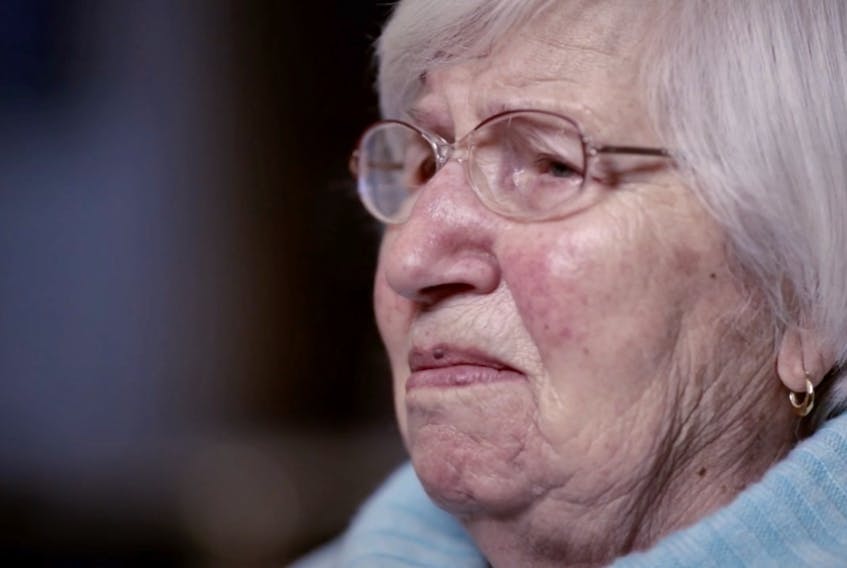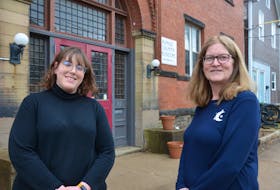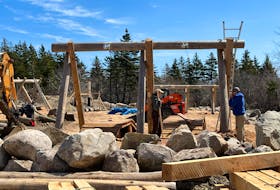This story was originally published Sept. 14, 2018, but we thought we would share it again for International Holocaust Remembrance Day.
Helena Jockel (née Kahan) was born in Czechoslovakia in 1919. She became an elementary school teacher and taught in Hungary. When the Nazis invaded that country in March 1944, she focused on saving “her” children. She accompanied them all the way to Auschwitz only to see them taken to the gas chamber. She returned to Czechoslovakia after the war and married her widowed brother-in-law, Emil Jockel. They immigrated to Canada in 1988 to join their daughter, Jana. Helena died in Halifax in November 2016.
Below are some excerpts from her memoir, “We Sang in Hushed Voices.” They are courtesy of the Azrieli Foundation, which started a program in 2005 to preserve the diaries and memoirs of Holocaust survivors.
I was told that in two hours they could kill two thousand people.

Each day, I learned more about the horrors of that surrounded me. How could it be that in the twentieth century, mothers and children were burned almost alive? My mother, my wonderful mother, was killed in a crematorium right after she arrived at the camp. People who knew me told me about it. In the camp, you saw the black, black smoke. The people who worked near the crematoria would tell you in a cold and calculating way, “If you have a mother, a father, a brother, a sister, they are here. This is the smoke and the blood of our people.”
In two hours they could kill two thousand people.
I was assigned to Lager C, Barracks 10, in Auschwitz-Birkenau, along with about eight hundred or a thousand other women. It was an ugly place. In the barracks, there was nothing but a mud floor, a roof and wooden pallets that served as our beds. The roof leaked, so when it rained the barracks floor became muddy. Fifteen women slept on each slab of wood that had nothing but a bit of straw on top. No pillows. No blankets. We could only lie on one side because if you turned over, all fifteen women had to turn at the same time. We turned anyways.
There were no toilets, only holes in the ground. There were no showers or sinks, so most people were unable to wash. There were bugs everywhere – all over the barracks and all the places where we worked. There were bedbugs where we slept. And rats. People died of disease from the unsanitary conditions all the time.
In two hours...
It hardly seems possible that amidst the horror and the chaos at Auschwitz-Birkenau, I could have recollections of some experiences of astonishing beauty and great poignancy. And yet, I do. One of those instances involved a group of Italian women who arrived just a few weeks after I did. They were artists, or more specifically, engravers. I don’t remember how I found out this detail, but somehow I knew their profession. What I remember most is that these women were hauntingly beautiful. They had sorrowful eyes, full of pity and regret.
The Italian women stuck together as a group. It felt like such a tragedy that nobody could speak with them. I think they spoke Italkian, a Judeo-Italian dialect. Since I knew Latin and a bit of Hebrew from school, I was able to have a bit of an exchange with them, with the help of some hand gestures. What impressed me was that in order to survive they seemed to be blocking out the tragic reality in which they found themselves. I tried to convey to them that what they were experiencing was not normal. I tried to tell them that we loved them. To me that these women were spiritually and physically magnificent. They appeared to be so pure, so naïve, their hearts open with an emotional transparency that penetrated my soul. I still do not clearly understand why my encounter with them had such a powerful and lasting effect on me. I was strangely affected by them, even to this day. None of them survived. Not one.
The small acts of courage were what made it possible to survive. One evening, we were made to stand for hours in the Appellplatz [and] when we were finally released, the latrine doors were locked….. This was the last straw for some of us, and we began to shout, “Let us pee!” over and over again. “Don’t let them suffer!” I called out. “Don’t torture people so much!”
Helena Jockel: We Sang in Hushed Voices from The Azrieli Series Short Films on Vimeo.
One of the female SS guards must have recognized my voice because she came over to me, as if I were to blame for the rebellion. Then, something unexpected happened. A friend of mine from Mukačevo, a woman named Hilda, came to my aid. I had known her before the war, and she was normally very quiet and reserved. Yet she rallied everyone together and encouraged them all to shout. All seven or eight hundred women in the area began shouting so loudly and with such intensity that the female SS guard grew afraid and left.
There was another way that we could resist – with hope. As we sat on the hard wooden bunks in our barracks, with only our thin, torn dresses to cover us, we still hoped that we would survive.… It was a time of emptiness, pain and desperation, a time when it was impossible to imagine a way out. There was no way out. But I often thought about miracles.
An important part of our resistance was singing. Although it seems paradoxical to talk about music and Birkenau in the same breath, when our work was done and the guards weren’t present, we could find safe moments to sing Hebrew songs. I couldn’t sing well, but it didn’t matter. None of us were really singers. Together we combined the words and the voices, singing in hushed voices so that no one would hear us. It gave us encouragement and lifted our spirits; in those moments, we didn’t speak about death and killing.
There were also concerts organized by the SS – although, these were hardly happy occasions for the Jewish prisoners. I recall one concert that was arranged by the camp administration. We were called to the Appellplatz and ordered to sit on the ground. What we saw in front of us was a group of men in their filthy, striped prison uniforms, emaciated from hunger, each one holding a violin, a cello or a wind instrument. They began to play – and, oh, how beautifully they played. Starving and ill, the musicians played waltzes by Johann Strauss while the SS guards danced to the music.
I began to cry inconsolably because those musicians were playing music that had been created to make the world a more harmonious and beautiful place. Yet these men, imprisoned and starving, were forced to play through suffering and humiliation. Strauss’s waltzes and operettas, which brought joy to listeners for a hundred years, had nothing in common with Hitler and his ideology.
Starving and ill, the musicians played waltzes by Johann Strauss while the SS guards danced to the music.
The two SS guards, one male and one female, who had accompanied us on the death march were the most cowardly of all human beings. We were sick, exhausted and helpless; they had guns. Yet, when we got to Dresden, they dressed themselves in civilian clothes and hid among us because, knowing that the Soviet army was so close, they were afraid that they would be killed. Suddenly, they were speaking to us nicely, pleading that what they had done was not their fault. They were innocent, they said, only doing what Hitler told them to do; they were just following orders. As they declared their innocence, we wept. I’m not sure if it was out of relief or because there, in the rubble of Dresden, the evidence of so much destruction and devastation finally sank in.
Amidst the chaos, the noise, the cries, I suddenly heard someone singing Hebrew words. It was Leah, a Slovak-Jewish girl from our group. She was standing up and singing the Jewish prayer, “Shema Yisrael” (Hear, O Israel, the Lord is our God, the Lord is One.) The Shema is the Jewish declaration of faith. It is the first prayer that a Jewish child learns and the last words a Jewish person says before he or she dies. Leah had such a soothing voice. Soon, each one of us joined in singing the prayer with her, each in her own language and voice, yet unified by our suffering. It was the single most hopeful moment of my ordeal in the Holocaust. It was also a profoundly soulful, beautiful and rare human moment in that quagmire of inhumanity.
In the morning, we realized that under cover of darkness the SS guards had disappeared. Cowards. When we were most vulnerable and powerless, naked and exposed, without a hope in the world, they had revelled in our humiliation. They had relied on our defenselessness for their power. Not one of them had the personal courage to help us or even to question what they were doing to us and why.









